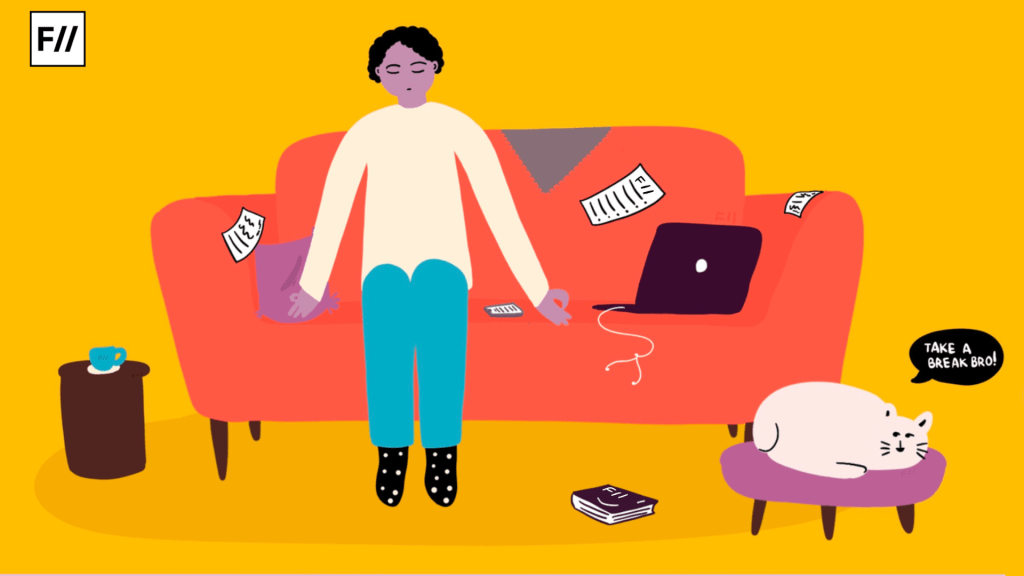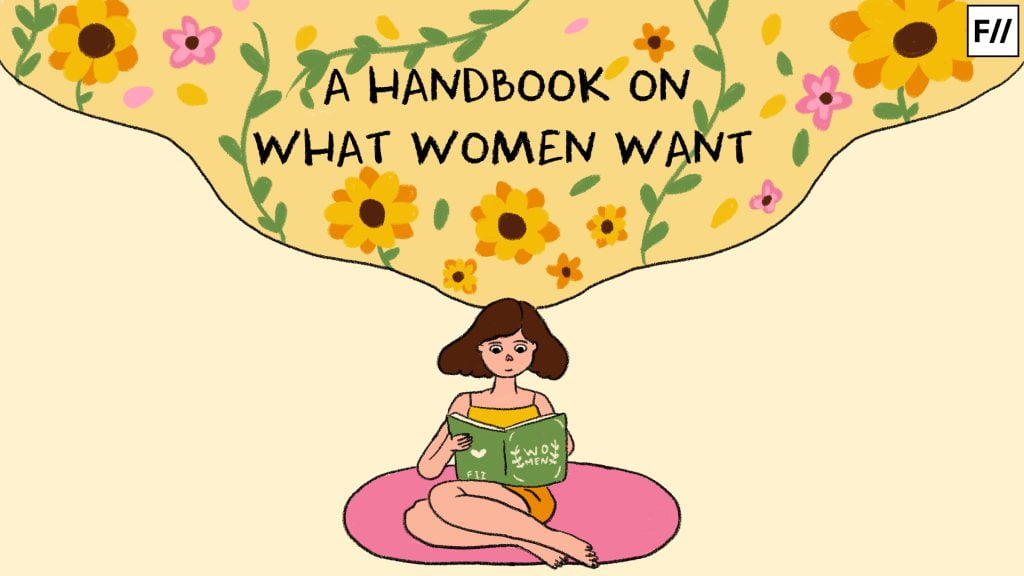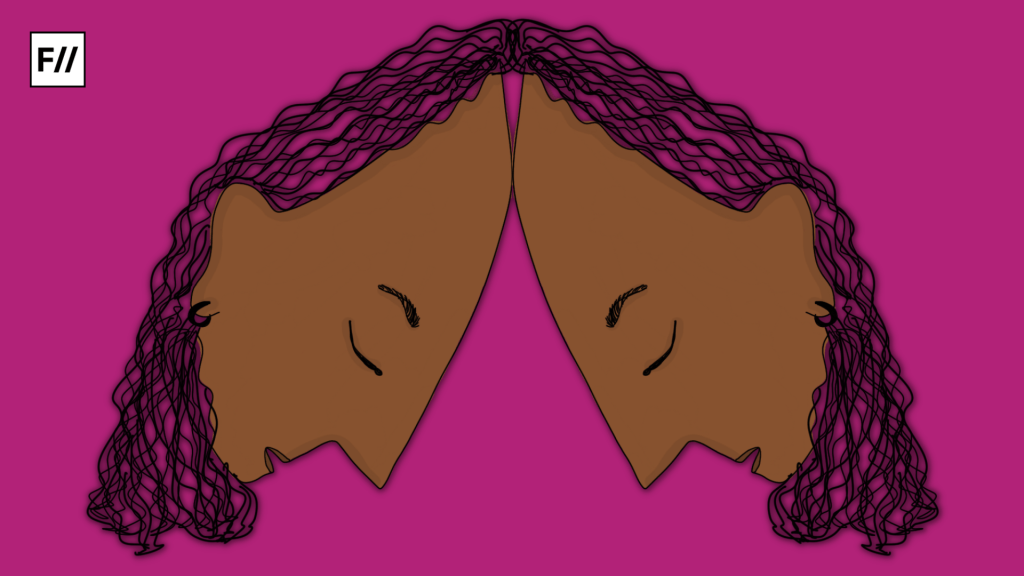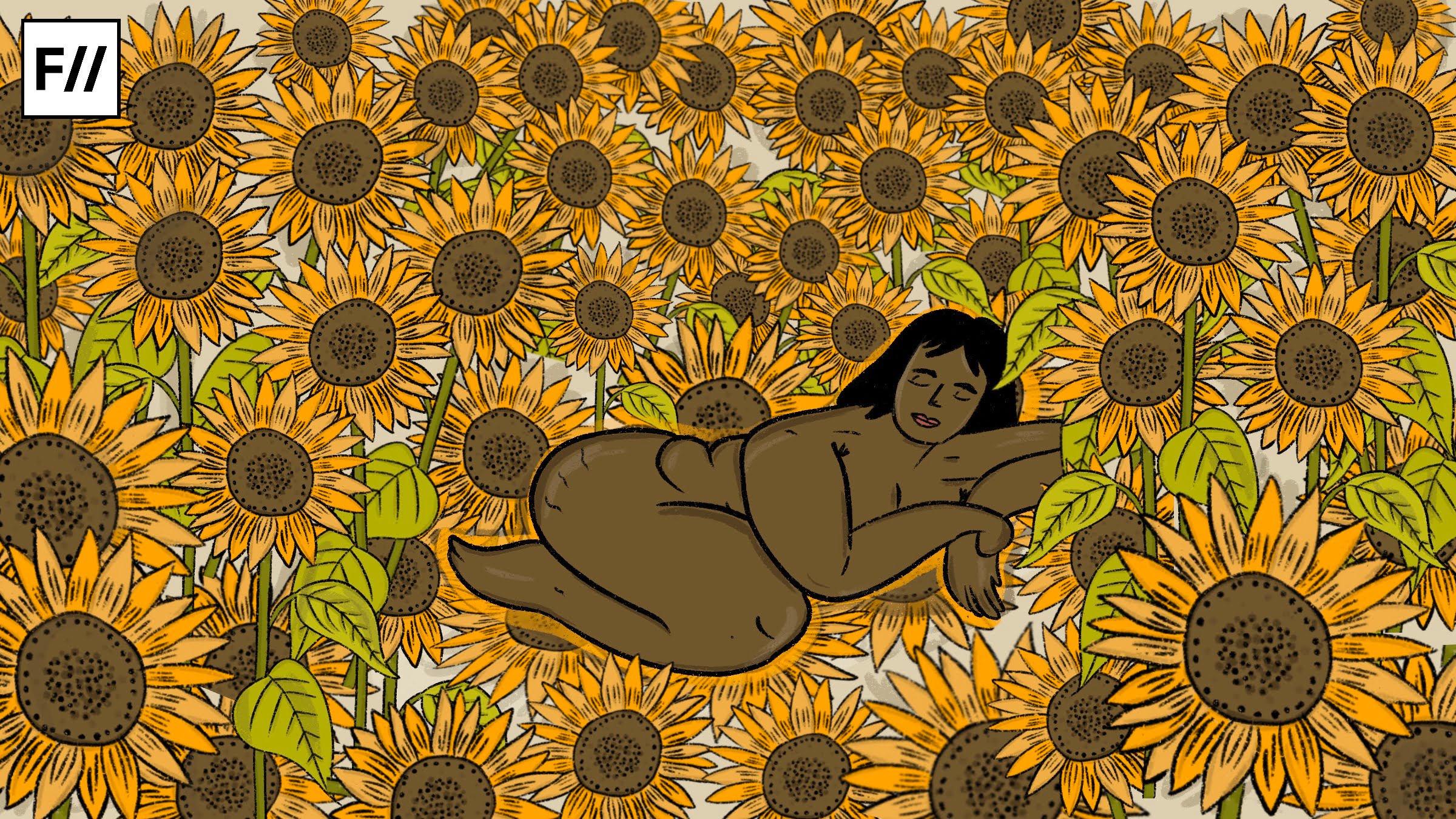Trigger warning: Mentions of assault
Have you ever felt completely seen in a character in TV or film? For me, it was the simplest scene in Dil Dhadakne Do. Shefali Shah, standing in front of a mirror, pushes a piece of chocolate cake into her mouth, tears streaking down her face, staring into her own eyes and ours. She’s been humiliated by her husband in front of friends and family, and at that moment this is her only recourse. A cry, silenced by cake, choking down and bottling up years of emotions.
My heart broke for her at that moment, but really, she was me. Many of us probably saw ourselves in her, using food as a way to feel a sense of control over a situation beyond us.
Our relationship with the food we eat is probably the most stayed and tested relationship in our lives. But for me, it has also been one of my most difficult relationships. Don’t get me wrong, food was always there for me. Amidst loneliness, body image issues, mental health crises, and assault, food has been my most consistent relationship. But, our relationship is fraught with comfort and deep shame in equal measure.
Food is control
Growing up I watched my mother, and my grandmother wage tiny acts of resistance against the men in their lives, using food. Mostly sweet men, but who demanded homemakers of our mothers. In response I’d hear, “He spoke to me rudely? Well, I won’t cook today, or better yet, I’ll burn the rice.” For them, food could be about control.

While not in the wake of domestic skirmishes, food became a way for me to control my emotions too. It could be spicy and salty when I was feeling feisty; sweet when I needed kindness.
When the boy I was crushing on in school made fun of my eczema, I could hide in a packet of Magic Masala so my shame could turn into anger at his inconsideration for something completely outside my control. When my uncle bought me a gym membership for my 16th birthday I could find forgiveness for the only way he knew to show affection in a bar of chocolate. No loss of control over my emotions.
Over the years, the world tried to control what I ate. Multiple nutritionists, doctors, kind friends and kinder strangers tried to advise away my PCOS, my rashes, or the ubiquitous weight issue itself by telling me mostly what not to eat. And I did earnestly try everything they said, at least once. Intermittent fasting, high protein low carb, no milk sugar, all-raw diets, the good, the bad and the ugly. When nothing seemed capable of bringing under control the uncontrollable, we always found our way back to each other. It was mine to crave and choose and savour as I wished.
Food is rebellion
And we learn quite quickly that there’s a lot we can’t control in the world. I certainly couldn’t control the people tut-tutting at the sight of me. So when a relative’s first comment on seeing me was that I had gained weight, food became a form of rebellion. I would sneak away snacks, stuffing my face in the privacy of a room or a bathroom, with the Indian-aunty-comment-of-the-day ringing in my ears with hot shame. Here, I would rationalise,

“Of course, it was bad of them to say anything, but all aunties are like this.“
“It comes from a place of concern, they don’t mean to be mean. they are a product of a system that made them this way.“
In those moments, food was an act of protest against that system, that saw us worthy of judgement before it considered us a person. A system, obsessed with the way we were meant to look, even before we became women.
It is quite the trope, but also ironic to use binge eating to feel better about your body image when you are objectively slightly heavier than the average and have developed the inevitable body image issues associated with it. But, my secret shameful binges felt like I was screaming to the world, “I don’t care what you think about the way I look!“
Eating became a shield
With that came deep shame. I could not count on my fingers the number of times I snuck Jim Jams or Milk Bikis into the house. I would hide them in the deep recesses of my bag so my parents or sister wouldn’t see, running past them on the stairs so I could stash them in my room. Knowing I would consume it only after everyone else went to sleep, and that I could sneak the wrappers out of the house the next morning. No one ever told me not to eat, mind you. It was just my dirty little secret.

Then it became a shield. When I was 17 I was assaulted by my then partner. It wasn’t the first time, but I was now old enough to know that what happened wasn’t ok. Overnight I was a different person, but mainly because I felt a new source of shame. Powerless, and bearing a new battle-scar on my mental health, food became a project. It could make me feel better at the moment, sure, but with any luck, in the long run, it might also make me completely invisible to men.
So I ate with abandon, even when it made me feel sick. I ate with the intention of invisibilising my experience, and by extension, myself. With that, while perhaps not a shield, food certainly became a shroud, like the thin veil of the dupatta acting as a purdah over my body. A way to protect my “erstwhile honour.” But it wasn’t a superpower, and it wasn’t sustainable. Not physically and not mentally as I tried to navigate the inherent desire to be desired.
A home away from home
When I moved away from Bangalore to Pune soon after I turned 18, I realised food could be a safety net too. This was the start of a transformation in our relationship, but I only realised this much later. In a new city around totally new people who did not know me, I was unencumbered by what had happened. But making friends in a new city is a lonely ordeal.
Biryani saved me. A ridiculous statement. I found a friend to go Biryani-hopping with, across the city. We tried several restaurants, commenting on the “choice of grain,” “integrity of meat,” and the “masala-to-rice ratio.” We knew nothing of which we spoke, but with biryani we found friendship.
When I started having panic attacks for the first time, every year around the time of, when the assault had happened – food would become nostalgic. In those weakest moments, I found myself reaching out for the familiar. A Cake Fudge from Corner House, a slice of Black Forest pastry from Sweet Chariot, and a rum tart from Fatima’s Bakery. When I couldn’t be in Bangalore physically I was begging my mother to please put quantities to ingredients as she narrated recipes over the phone so I could cook her dishes. When will Indian mothers realise that instructions like, “Grind some pepper, jeera, and other spices, andaaze se”, does not a curry, make! Whether successful or not, I was reaching out for bites of my childhood and a reminder of the safety they afforded me.
As I continued to move from city to city, she became a trusty companion. Anytime I felt shit about myself or the world, it was my one constant. Slowly but surely, familiar meals in unfamiliar places grounded me everywhere I went. The way we miss meals from “back home” when we’re away, I found myself missing mama’s fish curry rice when in Pune, but when I was in Bangalore I would also miss the dabeli from the cart near my hostel or Derani-Jethani ice creams.
Food is everything
In later years, food would help me spark a connection with my foodie (now) husband. It became the basis of many a joyful conversation, an experience and a bite we could share. Between trying each other’s favourite dishes and discussing the memories they sparked, or cooking elaborate meals for each other, it healed a part of me.

Today, as I find myself alone again in a new country, I’m happy to report that our relationship is healing too. I spend an awful lot of time cooking, being intentional with what I eat, but only because I see the comfort and community food has given me. I think of my aunt every time I cut lemongrass into my cup of chai. I think of my sister every time I throw a pinch of hing into her trusty daal recipe. I cook my mum and dad’s favourite dishes when I miss them. I share recipes with my friends hoping they’ll think of me when they make them.
There are of course still some bad decisions and occasional shame that comes with that. But I’m kinder to food and myself now. I can see that it can remind me of home, or help me explore a new city, or be the event over which I make a new friend. To paraphrase Fleabag’s powerful cry, “Food is everything, (Antony)! I wish it wasn’t so I could think of something else every once in a while, but it is.“
A woman’s relationship with food, whether we’re the feeder or consumer, or both, and even when we have the luxury to consume it with security, is often marred by the way the world sees and treats us. I hope we’re all healing this relationship one day at a time.




